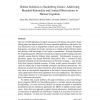Free Online Productivity Tools
i2Speak
i2Symbol
i2OCR
iTex2Img
iWeb2Print
iWeb2Shot
i2Type
iPdf2Split
iPdf2Merge
i2Bopomofo
i2Arabic
i2Style
i2Image
i2PDF
iLatex2Rtf
Sci2ools
136
click to vote
AI
2010
Springer
2010
Springer
Robust solutions to Stackelberg games: Addressing bounded rationality and limited observations in human cognition
How do we build algorithms for agent interactions with human adversaries? Stackelberg games are natural models for many important applications that involve human interaction, such as oligopolistic markets and security domains. In Stackelberg games, one player, the leader, commits to a strategy and the follower makes her decision with knowledge of the leader's commitment. Existing algorithms for Stackelberg games efficiently find optimal solutions (leader strategy), but they critically assume that the follower plays optimally. Unfortunately, in many applications, agents face human followers (adversaries) who -- because of their bounded rationality and limited observation of the leader strategy -- may deviate from their expected optimal response. In other words, human adversaries' decisions are biased due to their bounded rationality and limited observations. Not taking into account these likely deviations when dealing with human adversaries may cause an unacceptable degradati...
| Added | 20 Mar 2011 |
| Updated | 20 Mar 2011 |
| Type | Journal |
| Year | 2010 |
| Where | AI |
| Authors | James Pita, Manish Jain, Milind Tambe, Fernando Ordóñez, Sarit Kraus |
Comments (0)

